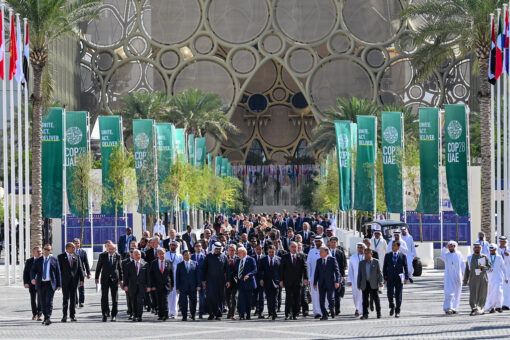
The 2023 United Nations Climate Change Conference (COP28) held in Dubai, UAE was a landmark in many ways. The health community welcomed the first-ever health day which led to the signing of the Health and Climate Declaration by over 140 countries. The UK was involved in the drafting of this declaration which recognises the health impacts of climate change and also that health is crucial to drive climate action. However, the declaration could have been made stronger by including a full fossil fuel phase-out, the primary driver of climate change, for maximum health benefits.
In November this year, 46.3 million health professionals supported a letter to the COP28 president that emphasised from a public health perspective the need to reduce dependency on fossil fuels by investing in clean energy. While the inclusion of “transition away from fossil fuels” in the UAE consensus is a milestone that should mark the beginning of the phase of fossil fuel phaseout, it is far too little happening far too late and without a clear-cut pathway on how this transition will be achieved
The operationalisation of the loss and damage fund was an achievement, although the $700 million pledged falls short of the $100 billion required per year. Following the Kunming-Montreal Biodiversity Framework 2022, there was re-emphasis on the need to halt nature and biodiversity loss by 2030 to reach the Paris Agreement target of limiting global heating to 1.5℃. Food was also mentioned for the first time in the final text along with a declaration on food and agriculture signed by over 160 countries.
At COP28, in a first-of-its-kind initiative, the COP28 president (UAE) and COP15 president (China) released a Joint Statement on Climate, Nature and People which recognised that climate change and biodiversity loss are mutually reinforcing each other. This has been endorsed by 15 countries. This reflects an editorial earlier this year in which 300 health editors called for the climate and biodiversity COP processes to be brought together, recognising the interdependence of both. And they have called for the combined threat to be recognised as one indivisible global health emergency which demands a “Health in All Policies” to be adopted in the negotiations to ensure the health impacts and actions to protect health are considered at every stage of the process.
Despite all the shortcomings and loopholes, COP28 has somewhat managed to begin the end. As time is a crucial factor, waiting another year to renegotiate the shortfalls and fill the gaps is not good enough as global temperatures continue to break records. The UN secretary general, António Guterres, has said multiple times now that we are heading towards a “hellish” future with global average temperature rising to 3℃.
COP29 in Azerbaijan must do better and deliver clarity on the full phase-out of fossil fuels with a just transition to clean energy. There is also a need for mobilising additional finance into the loss and damage funds to ensure climate justice. Further integration of dialogue on the climate and ecological crises would also be a significant achievement. Advancing the negotiations on mitigation in food systems will be critical as they are responsible for one-third of the global greenhouse gas emissions.
As health professionals, we will continue to advocate for holistic and just climate actions.
As for the UK which became one of the world leaders in climate action by legislating the Climate Change Act in 2008, there is potential to re-emerge as a world leader in green policies despite the recent backward trends. And, we hope the COP28 UAE Declaration provides a direction to policymakers to act in the best interest of people and the planet.
We know not to expect too much from COPs, but it was progress that health was finally included in the negotiations after 27 COPs where it wasn’t included. The statement on transitioning away from fossil fuels is a step forward, but what we really need is an end to new exploration and subsidies for fossil fuels and as rapid a phase-out as possible. Even words can be hard to achieve at COPs, but action is harder. Sadly the amount of greenhouse gases in the atmosphere has risen after every one of the 27 COPs, and this COP will not be an exception.
Dr.Richard Smith, Chair, UK Health Alliance on Climate Change
The COP processes can be quite tedious and the UAE consensus including ‘transition away from fossil fuels’ is perhaps at best an illusionary victory – because the actions of our government do not mirror the urgency that is needed to mitigate and adapt to climate change. Health is slowly getting recognition in the climate discussions, but the much needed ‘Health in All Policies’ approach is far from achieved.
Dr. Anandita Pattnaik, Policy Officer, UK Health Alliance on Climate Change
